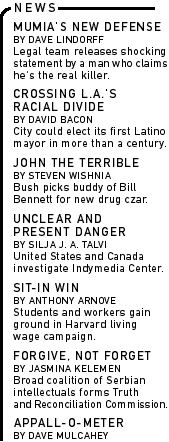

|

|

|

|
|
|
| |
|
|
|
When progressives argue in favor of the peace dividend, they often make the mistake of assuming that rational arguments are sufficient to convince people that with the Cold War over we no longer need a defense budget three times bigger than the combined total of our foes. Conservatives view the huge U.S. military presence as a necessity and viscerally oppose any reduction in it. What accounts for this? Obviously the massive PR effort generated by the military-industrial complex plays its part. But that doesn't account for the Pavlovian response that grips conservatives whenever the peace dividend is mentioned. In Moral Politics: What Conservatives Know That Liberals Don't (University of Chicago Press, 1996) Professor George Lakoff of the University of California, Berkeley posits that conservatives and progressives fundamentally differ because their worldviews stem from two distinct views of the family. He describes these as the "strict father" model and the "nurturant parent" model. The strict father model exists within the framework of the traditional patriarchal family, where the father sets the rules and enforces them and the mother takes care of the children and is subservient to the father. Children live within a system of "tough love," military-style discipline. "Self-discipline, self-reliance, and respect for legitimate authority are the crucial things that children must learn," Lakoff writes. When children mature, they internalize the father's rules and discipline--and become conservative. They see the world as a dangerous place in which survival requires military-like discipline and guns. The armed forces are charged with protecting the nation––with the president as the symbolic commander-in-chief and "father of the country"––and maintaining the capacity to use overwhelming force as a deterrent to hostile foreigners. It follows from this worldview that peace is an external state that cannot be achieved without a massive U.S. military; thus, we have no choice but to become the world's police force. The nurturant parent model is fundamentally different. The system is not based on rules and discipline, but created around a framework of "love, empathy, and nurturance." The parents are equal partners. "The obedience of children comes out of their love and respect for their parents and their community,"Lakoff writes. Maturity comes from developing a positive self-image. Lakoff believes that progressives grow up within egalitarian families governed by the nurturant parent model. From this perspective the world is not a jungle. While a military presence is needed, that military does not have to be capable of overwhelming force. It does not need a massive nuclear arsenal or the capacity to fight two wars at once. Indeed, the United States can and should form supportive alliances with other nations. This worldview envisions a society where people are interdependent (and not inherently competitive). Foreigners are not seen as absolutely different. They also want life, liberty and the pursuit of happiness. From this perspective, peace has more to do with emotional maturity and self-confidence than it does guns and police––there can be peace without a massive U.S. military presence. Lakoff's argument that conservatives and progressives are fundamentally different suggests that facts and rational arguments will not decide the peace-dividend debate. For conservatives the military will never be strong enough. Plus conservatives are very suspicious of many of the programs that would be funded by the peace dividend, i.e., the social safety net. To make the argument for the peace dividend, we must bridge this
cultural divide. My next column will suggest some ways to accomplish
this. As always, I welcome your feedback (bburnett@inthesetimes.com).
|


